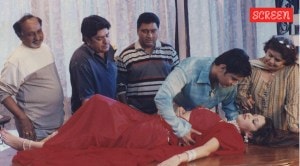Gujarat hasn’t notified hamlets as gram sabhas under PESA Act: NCST panel
The committee, headed by Govardhan Munde, is visiting Gujarat as part of the NCST's review of the implementation of the PESA Act in states across India. The other members of the committee includes Milind Thatte, Captain Smita Gaekwad and Mimasa Paroliya.
 The families of the deceased alleged that they were abducted and later murdered by a group of cow-vigilantes.
The families of the deceased alleged that they were abducted and later murdered by a group of cow-vigilantes. A four-member committee of the National Commission for Scheduled Tribes (NCST) on a visit to Gujarat Monday observed that the state was yet to notify hamlets as ‘gram sabhas’ under the provisions of the Panchayat (Extension to Scheduled Areas) (PESA) Act. The committee also directed the forest department to “not deprive” villagers of their rights unless their pending claims are settled.
The committee, headed by Govardhan Munde, is visiting Gujarat as part of the NCST’s review of the implementation of the PESA Act in states across India. The other members of the committee includes Milind Thatte, Captain Smita Gaekwad and Mimasa Paroliya.
The committee has observed that most issues pertaining to land arise due to the lack of implementation of the PESA Act in Gujarat. “The commission can take up regular reviews of implementation of laws and rules that are relevant to Scheduled Tribes and this is one such visit. The PESA law is in force and the rules are in place, too, but PESA provides for the hamlet to be notified as a gram sabha, which is not part of the rules in Gujarat. In the rules of Maharashtra, MP and Chhattisgarh, they have explicitly stated that hamlets should be notified as a gram sabha. But Gujarat rules do not have any such notification and so the (PESA) Act makes no sense,” Thatte said.
On Monday, the second day of their visit to Gujarat to inspect the issues facing tribal areas, the NCST-constituted working group visited Chhota Udepur where villagers from Amta petitioned the committee about their imminent displacement. “One of the 12 complaints we have received so far was from Amta. They said that their claims were pending and the forest department had instructed them not to till soil or cultivate on the land as the forest department has planned a plantation. So, the committee decided that unless their claims are settled, they cannot be deprived of their rights by any government agency,” Thatte told The Indian Express. The forest department has been told to hold the eviction until the pending claims are decided.
On Sunday, the committee interacted with about 1,000 villagers from 40 villages of Dediapada and Sagbara talukas of Narmada district where most of the grievances pertained to ownership titles of lands. According to local officials who are accompanying the committee, there were a number of complaints about the revenue records, especially Form 7/12 in which many villagers have been indicated as “second owners”—the first owners being the forest department.
The committee also took along volunteers of the Action Research in Community Health and Development (ARCH) Vahini group that works with tribals, during their visit to the villages. Ambarish Mehta of ARCH Vahini said, “In his address to the villages in Narmada, Munde said the grievances of the people were genuine and the committee would include the issues in their report and also make recommendations to the district collectors regarding the same. He also advised the tribal people that they could approach the commission for any petitions, even other than the matters concerning forest department and land issues.”
On Tuesday, the committee will visit Dahod.







